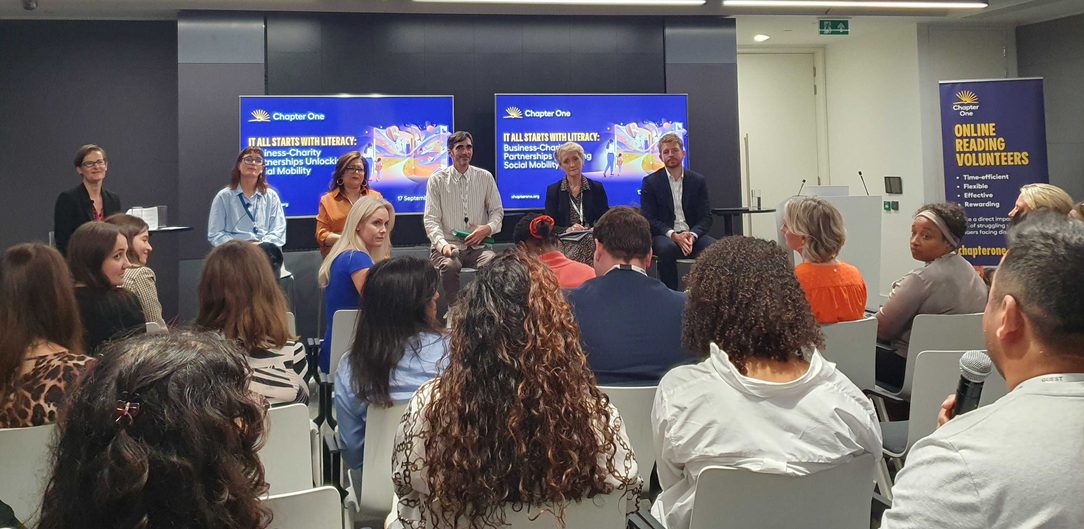19 September 2025
Corporate partners rally around literacy as driver of social mobility
Expert panel discussion highlights urgent need for collective action ahead of National Year of Reading 2026
Share this page

On Wednesday this week an array of business leaders and corporate partners gathered at the London offices of our Platinum partner KPMG UK, for Chapter One's breakfast discussion "It All Starts With Literacy: Business-Charity Partnerships Unlocking Social Mobility".
The panel event, chaired by Chapter One CEO Emma Bell, brought together diverse experts to explore how purposeful partnerships between business and charities can drive genuine social mobility through literacy support.
The reality behind the statistics
Hina Shah, headteacher of Earlsmead Primary School in South Tottenham, opened with stark statistics about educational inequality. Her school serves a community where 73% of children have English as a second language across 38 different languages, and 60% of Year 6 pupils qualify for pupil premium. Despite these challenges, the school's pupils achieve above national average in reading through strategic, systematic approaches, including Chapter One’s Online Reading Volunteers Programme.
"They are no less ambitious than any of the parents in this room," Shah told the business audience about her pupils' families. "They desire nothing less than we do for our own children."
Personal transformation through reading
Omar Mentesh, social value delivery consultant at Capgemini and founder of Anabranch Plus, shared his powerful journey from leaving school at age 9 to discovering reading in prison at 15. His testimony provided compelling evidence of literacy's transformative potential.
"The first book I ever picked up was when I was in prison at 15... I understood just then why people read, because it allowed me to escape from that prison," Mentesh explained. "It changed my value system. It changed my outlook on life."
Those young people who are motivated to read, who read frequently, attain highly. Therefore it's a tool for social justice. It is literally a tool to transform society.
Teresa Cremin, professor of education and co-director of the Open University's Centre for Literacy and Social Justice
International evidence links reading to life outcomes
Teresa Cremin, professor of education and co-director of the Open University's Centre for Literacy and Social Justice, offered insights from research for the literacy-social mobility connection, drawing on large-scale international studies.
"Those young people who are motivated to read, who read frequently, attain highly," Cremin explained. "Therefore it's a tool for social justice. It is literally a tool to transform society."
Cremin pointed to data showing a 20-year decline in reading for pleasure and stressed that successful literacy support must balance reading skills with fostering a desire to read: "The desire drives the reader on. So we do have to be really conscious that those one-to-one [reading] volunteers are balancing the skill set of the young people, growing their sense of self-confidence and efficacy at the same time as developing their desire."
Ryan Henson, a Commissioner at the Social Mobility Commission, reinforced this foundational role of literacy: "It's the foundation stone, literally, of all social mobility. You just can't progress or get on without it."
There is no legitimacy or credibility to talk about one single organisation [changing social mobility]. But when we talk about a collective of businesses... that's when we can start to talk more meaningfully about what we're doing.
Corrine Harms, deputy head of corporate responsibility, KPMG
The role of business and the power of collective action
Corrine Harms, deputy head of corporate responsibility at KPMG, stressed the importance of collaborative approaches: "There is no legitimacy or credibility to talk about one single organisation [changing social mobility]. But when we talk about a collective of businesses... that's when we can start to talk more meaningfully about what we're doing."
Harms also highlighted how literacy partnerships can deliver both social impact and business value through employee engagement, talent pipeline development and authentic demonstration of corporate values.
A call to action
With the National Year of Reading aiming to recruit 100,000 new volunteers in 2026, the appetite for business engagement is clear. Chapter One continues to work with corporate partners to provide flexible, evidence-based reading programmes that connect children with reading support at the time they need it most.
If you’d like to find out more about how you can give your employees a meaningful way to impact children’s lives by volunteering 30 minutes a week to read with a child online, reach out to Sarah Taylor, our Business Development Manager at sarah.taylor@chapterone.org.

It all starts with literacy.




